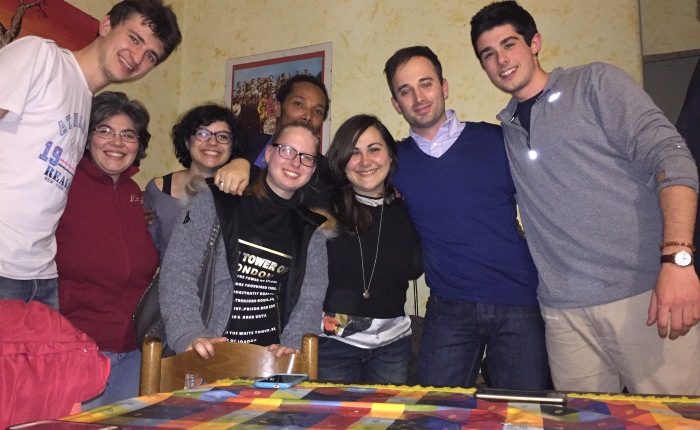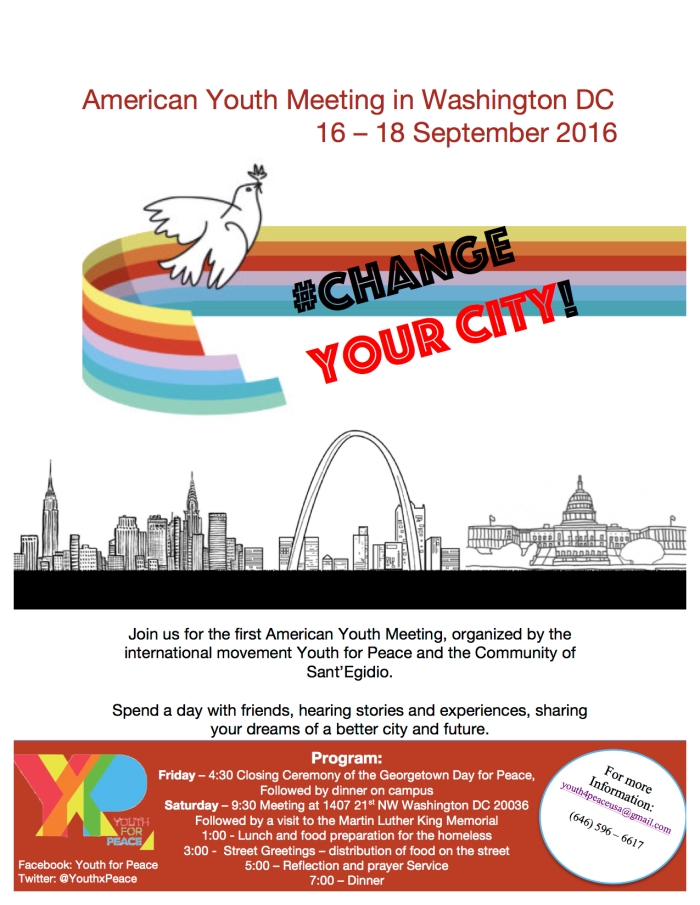Matt O’Donnell, Chicago
Community of Sant’Egidio | August 26th, 2016
It’s late August. A time occasionally referred to in the film industry as a “dump” month (elegant phrase, isn’t it?). A month where studios release, in a large quantity, films that they were contractually obligated to produce. Typically, these films are of a much lesser quality than the blockbusters from earlier in the summer. It can be a real downer because it means that the malaise of summer winding down is starting to set in, and we are still about two long weeks from conference play in college football. So, at a time when entertainment is sparse, the days start to shorten ever so slightly, and families prepare for yet another year of school, I thought I would try to provide some relief by sharing the story of my trip to Rome earlier this year.
I’ve told this story to several friends. Many responded by saying how “cool” or “awesome” it was that I had successfully flipped an emotionally and financially bankrupt situation into something positive. But of these reactions, one really stuck with me. It was, “wow – that’s like something out of a movie, man.” And when I thought about it, the way that I came to meet the Community of Sant’Egidio did seem to have some of that Hollywood magic. Not because it was glamorous or extravagant, or because of anything that I did, but because – well I don’t want to give it away in the opening credits. You’ll have to keep reading:
The story starts like many of our favorite romantic comedies – with love lost. I had been seeing someone for the better part of five years. We got along well and really enjoyed being around each other. When she found out last October that she would be spending the first half of this year in Rome, I immediately purchased my ticket and began planning a three-week trip to see her in February. However, two months later, around Christmas, we had decided to go our separate ways. It was really difficult but before I could reflect on what happened, I knew the first step was addressing the expensive elephant in the room: my round-trip ticket to Rome.
What would I do for three whole weeks in a country where the best I could do to communicate was speak some Spanish? I couldn’t do it. I would be by myself, miserable, for three weeks. I told myself that I had to cancel the trip. Canceling the hotels was easy, but the airline was a much more formidable opponent. So I concocted a story that stretched the truth a bit and called this airline during one of my lunch breaks. Now, for all the fine people who labored as my educators throughout the years, you know firsthand I was very creative when it came to where my homework assignments had occasionally and mysteriously vanished. But I stood no match for Debra from United whose argument was, “I’m sorry sir but you bought a non-refundable ticket when you had the option to buy a refundable one.” Damn Debra, you’re good – now, I have to go.
At this point, I pivoted my thinking. I had to. I was going to make the best of this trip and use the next seven weeks to figure out how. So I got to thinking. What would I do once I got there? What is something I always enjoy? Well, that one was easy – helping others. From Polar Plunge to coaching high school Mock Trial (shout out to Cristo Rey Chicago, we’re winning it all this year), I always enjoy helping others. I thought about a story I read in The Slight Edge, a book my good buddy Ben recommended. The essence of the story is a six-degrees of separation type thing. If I remember correctly, the man in the story wants to start a business in Germany, so he constantly asks about Germans. Eventually, he met someone who knew someone else that knew Germans. So what did I do? That’s right, ask about Italians. Who knows any? Who? Where? How? What do they do? And sure enough, someone knew some Italians. Not only did they know Italians, but they also put me in touch.
I started the next chain of connections. I e-mailed Father Bob Maloney, a friend of my friend. He connected me with his contact, Gianni. Gianni e-mailed me back and put me in touch with Paola. We scheduled a time to speak on the phone and we made plans to meet at a Saturday evening mass at Santa Maria in Trastevere, a neighborhood in Rome. Finally, Thursday, February 11th arrived and I got on the Blue Line after work to go to the airport. That was it. I was off. Not a clue as to what the next eighteen days would hold. And that’s the part of the story that feels the most cinematic. I was alone, lost, and unprepared. But I was willing to seek out grace and friendship and I was definitely challenging myself to accept them both if they came my way. When I met Paola that night after mass, she welcomed me with open arms and spoke to me as if I was an old friend. The next day she picked me up and we went to celebrate mass in Primavalle with some elderly and intellectually disabled friends (or as they are more aptly in Italian called gli amici, “the friends”).
The rest of my time was day after day of meeting wonderful people and encountering life long friendships. Friendships with Paolo, Gabriella, Natasha, Odair, Fernando, and Zeger. Friendships with Gabriele, Gianni, Monica, Arnalda, Rafaela, Giulio, Mauro, and Elena. People who gracefully pulled me through the obstacle of the language barrier. Like the time I kept calling a baby a nuotano (which literally translates to I swim) instead of a neonato (newborn). People who surrounded me with love and made me forget any sadness I had brought with me. Like when I found out upon arriving that my apartment was four blocks from where the person I bought my ticket for was staying and that to get to the Vatican I had to walk past it (definitely the stuff of a romcom, right?!). And people who taught me that you are limiting yourself if you view helping others as service work. Like when I met with the amici for the last time before my return journey to Chicago and realized that this was not a service trip, but a trip that provided me with dozens of new friendships. Friendships on the other side of the world that had only been waiting for me to take the first step.
And that is what the Community has meant to me since I’ve returned to Chicago. It has taught me that, yes, service is great because it pushes us to share our time and talents with others. But friendship is there too and like the air we breathe it is something we all have within us. To me, Sant’Egidio is not a service group. It is not a “church group” or set of rules on how to live your life. It is an invitation to friendship. An invitation that is addressed to everyone and only asks of the recipient that they share this invitation with others. The actions of the Community show this every day. From working with the Italian government to bring refugee families safely to Italy through the Humanitarian Corridors program, to the march through the Jewish quarter in Rome in remembrance of the deportation of the Jewish people in the thirties, to the D.R.E.A.M. project that fights AIDS and malnutrition in Africa, and to the yearly Christmas lunch celebrated simultaneously each Christmas Day in the communities around the world. Sant’Egidio welcomes everyone as long as you are willing to accept love and friendship and peace and share it with others.
That is why starting a Community in Chicago has become important to me. Most days I am proud to be a Chicagoan, but there are many days I am not. I fear that the violence and tragedy that happens on a weekly basis has become so commonplace that we are numb to it. But I know that with friendship and patience we can change that. We can curb the violence and shine a light on so many positive and wonderful people and things that go on in this city on a daily basis. The fact that the outside world views Chicago as an extremely violent city just provides us with an even greater opportunity to be a profound example of change. As one of my American heroes, Dr. Martin Luther King Jr., famously said during a 1957 sermon, “Darkness cannot drive out darkness; only light can do that. Hate cannot drive out hate; only love can do that.” To me, friendship is the primary vehicle through which love travels. To me, this is what the Community of Sant’Egidio offers us all. Even if I can’t establish a group that can stand on its own, I think an important start is to change how I act, and do so by inviting all I encounter into a friendship.
So, if you ask me, yeah they could definitely make that into a movie – one in which I would obviously be played by either Leo DiCaprio or maybe even Tom Crusie. But in all seriousness, when I look back on this experience, it shocks me how blessed I was to have had it. The experience was one that I could not have foreseen – it was completely unscripted. And that’s the beauty of it. All I had to do on my end was look. When I opened my eyes and looked, I found friendships. I found love. I found peace. I found hope. It reminds me of one of my (fictional) heroes, who once wisely said, “Life moves pretty fast. If you don’t stop to look around once and awhile, you just might miss it.”

